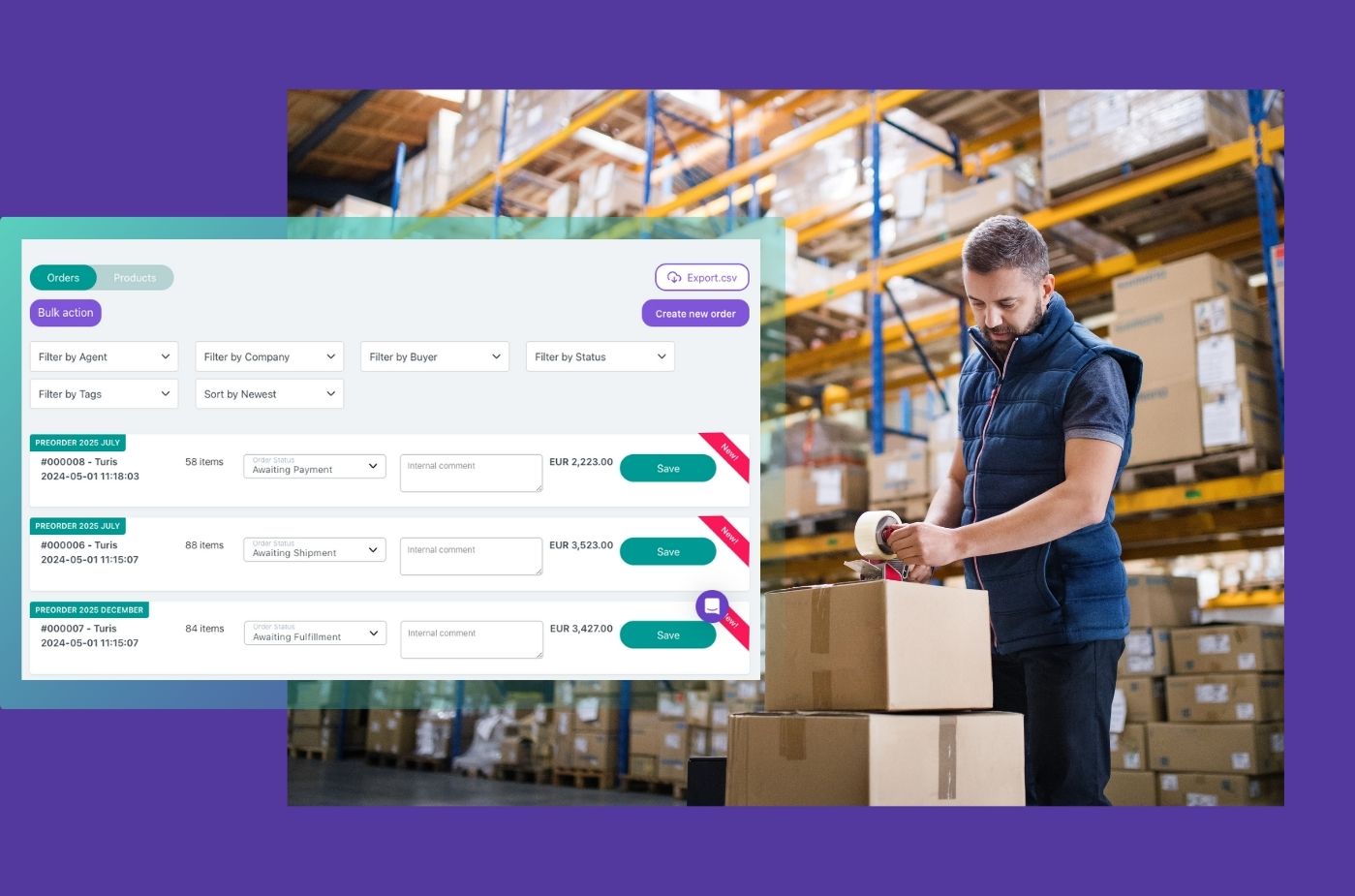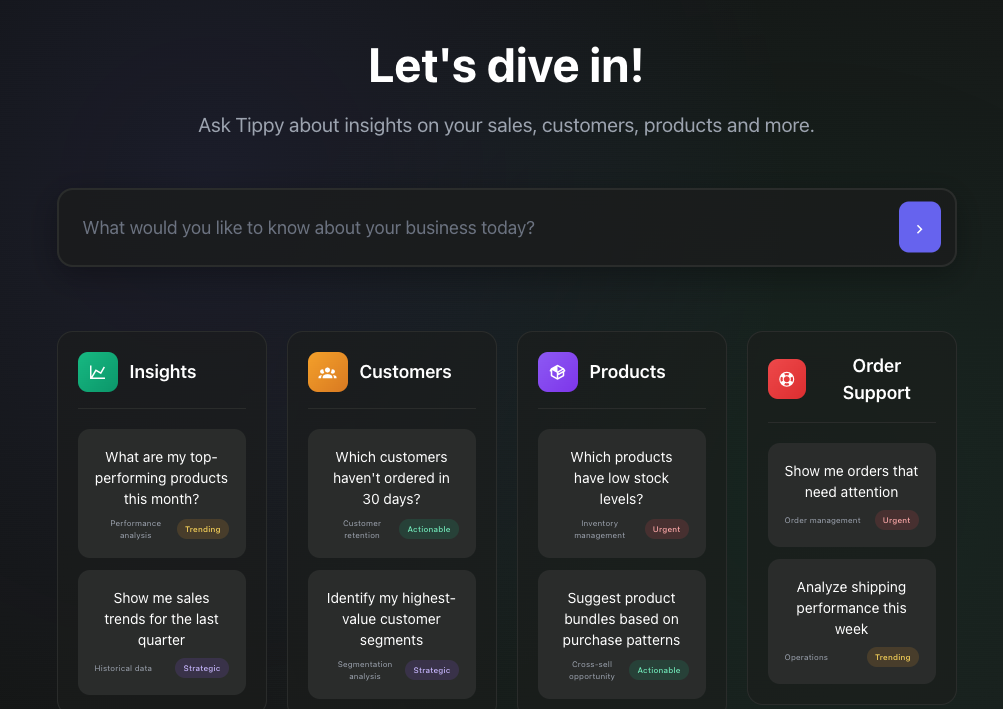Best B2B eCommerce order management software: Turis

Managing orders efficiently is crucial for success in the dynamic world of B2B eCommerce. B2B order management involves the processes and systems that help businesses track, manage, and fulfill orders from other companies. As B2B transactions often involve larger quantities, higher values, and more complex logistics than B2C, having a robust order management system (OMS) is essential.
Table of Contents
- What is B2B order management?
- Why B2B eCommerce order management is crucial?
- Essential elements of a strong B2B order management system
- Common challenges in B2B eCommerce order management
- Benefits of using B2B eCommerce Order management software
- How Turis improves B2B eCommerce Order management processes
- Integration with ERP and CRM Systems
- Integration with invoicing and accounting systems
- Integration with shipping and dispatching systems
- Key features of Turis B2B eCommerce order management system
- The future of B2B eCommerce order management
What is B2B order management?
B2B order management refers to the systematic approach to processing and fulfilling orders placed by other businesses. It encompasses the entire lifecycle of an order, from its placement to delivery, including inventory management, order tracking, and customer communication. Unlike B2C, where the focus is on individual consumers, B2B order management deals with bulk orders, customized pricing, special discounts, and often more complex delivery requirements.
Why B2B eCommerce order management is crucial?
Efficient B2B order management is vital for several reasons:
- Customer Satisfaction: Timely and accurate order fulfillment leads to higher customer satisfaction and loyalty.
- Operational Efficiency: Streamlined processes reduce manual errors, save time, and lower operational costs.
- Scalability: An effective system can handle increasing order volumes as the business grows.
- Data Accuracy: Real-time data on orders and inventory helps in better decision-making and planning.
- Compliance and Reporting: Ensures compliance with industry regulations and provides detailed reports for analysis.
Essential elements of a strong B2B order management system
A comprehensive B2B order management system includes several critical components:
- Order Processing: Captures order details and initiates the fulfillment process.
- Inventory Management: Monitors stock levels to ensure availability and manage reordering.
- Order Tracking: Provides real-time updates on the status of orders.
- Customer Management: Maintains detailed records of B2B customers and their order history.
- Integration Capabilities: Connects with other systems like ERP, accounting software, and warehouse management systems.
- Reporting and Analytics: Offers insights into sales performance, order trends, and inventory levels.
Common challenges in B2B eCommerce order management
Customized B2B Pricing: B2B transactions often have different pricing for different customers based on factors like order volume and contracts. Managing these varied pricing schemes adds complexity, requiring systems that apply the correct pricing automatically.
Complex B2B Fulfillment Process: Fulfilling B2B orders involves coordinating multiple departments and external partners. The system must track and manage every step from picking and packing to shipping and delivery to avoid delays and errors.
B2B Regulatory Compliance: B2B businesses must adhere to various industry regulations. The order management system must track compliance at every step to avoid fines and ensure legal adherence.
B2B eCommerce Integration: Seamless integration with existing systems like ERP, CRM, accounting, and warehouse management is crucial. This integration ensures smooth data flow, reduces manual data entry, and keeps all departments informed with real-time updates.
Benefits of using B2B eCommerce Order management software
Investing in specialized B2B order management software can significantly enhance business operations. Here are the key benefits:
- Automation of Processes: Automates repetitive tasks, reducing manual errors and saving time.
- Real-Time Inventory Management: Keeps track of inventory levels in real time, preventing stockouts and overstock situations.
- Enhanced Order Accuracy: Ensures accurate order capturing and processing, reducing the risk of errors.
- Improved Customer Experience: Provides customers with real-time updates and faster order fulfillment, boosting satisfaction.
- Scalability: Supports business growth by handling increasing order volumes without compromising efficiency.
- Better Decision Making: Provides valuable insights through reporting and analytics, helping in strategic planning.
How Turis improves B2B eCommerce Order management processes
Turis, a leading B2B eCommerce platform, offers a comprehensive solution for managing B2B orders. Here’s how Turis makes a difference:
- Seamless Integration: Turis integrates with ERP systems, accounting software, and warehouse management systems, providing a unified platform for managing orders.
- User-Friendly Interface: The intuitive interface simplifies complex B2B processes, making it easy for users to manage orders, inventory, and customer data.
- Automated Workflows: Automates the entire order management process, from order placement to fulfillment, reducing manual intervention and errors.
- Real-Time Updates: Provides real-time order tracking and status updates, ensuring customers are always informed about their orders.
- Customization: Allows businesses to customize pricing, discounts, and order processes to meet specific customer needs.
- Scalability: Designed to grow with your business, Turis can handle increasing order volumes and complexity.
- Comprehensive Reporting: Offers detailed reports and analytics on sales, order trends, and inventory levels, aiding in better decision-making.
See all our integrations and connectors

Integration with ERP and CRM Systems
ERP Integration: Turis integrates with various ERP systems such as SAP, Microsoft Dynamics, and Oracle NetSuite. This integration ensures that all order data, inventory levels, and customer information are synchronized across platforms, reducing manual data entry and errors. By connecting with ERP systems, businesses can streamline their operations, improve data accuracy, and enhance overall efficiency.
CRM Integration: Turis also integrates with popular CRM systems like Salesforce and e-conomic. This integration helps businesses manage customer relationships more effectively by providing a unified view of customer interactions and order history. CRM integration enables personalized communication, better customer service, and improved sales processes.
Integration with invoicing and accounting systems
Invoicing Systems: Turis supports integration with invoicing systems such as QuickBooks, Xero, and FreshBooks. This integration automates the invoicing process, ensuring that invoices are generated accurately and sent to customers promptly. Automated invoicing reduces administrative workload, minimizes errors, and accelerates payment collection.
Accounting Systems: By integrating with accounting systems, Turis ensures that all financial data related to orders, payments, and refunds are accurately recorded. This integration simplifies financial management, improves cash flow visibility, and supports compliance with accounting standards.
Integration with shipping and dispatching systems
Shipping Integration: Turis connects with major shipping carriers and dispatching systems like UPS, FedEx, and DHL. This integration streamlines the shipping process by automating label generation, tracking shipments, and providing real-time updates to customers. Automated shipping processes reduce manual intervention, minimize shipping errors, and enhance customer satisfaction.
Dispatching Systems: Integration with dispatching systems allows businesses to manage their logistics and delivery operations more efficiently. Turis ensures that orders are dispatched promptly, and customers receive their products on time. This integration improves order fulfillment, reduces delivery times, and enhances the overall customer experience.
ERP and accounting system integration in B2B eCommerce platforms: The ROI

Key features of Turis B2B eCommerce order management system
- Order Processing: Captures and processes orders efficiently, ensuring accuracy and speed.
- Inventory Management: Monitors stock levels in real-time, automating reordering processes to prevent stockouts.
- Order Tracking: Provides real-time updates on order status, enhancing transparency and customer satisfaction.
- Customer Management: Maintains detailed customer profiles and order history, enabling personalized service.
- Integration Capabilities: Seamlessly integrates with existing systems like ERP, accounting software, and warehouse management systems.
- Reporting and Analytics: Delivers insights into sales performance, order trends, and inventory levels, helping in strategic planning.
The future of B2B eCommerce order management
The future of B2B order management lies in further automation, enhanced integration, and improved customer experiences. Here are some trends to watch:
- AI and Machine Learning: Leveraging AI for predictive analytics and demand forecasting to optimize inventory management and order processing.
- Blockchain Technology: Using blockchain for secure and transparent transactions, ensuring data integrity and reducing fraud.
- IoT Integration: Integrating IoT devices for real-time tracking of goods and automated inventory management.
- Enhanced Personalization: Offering personalized experiences through customized pricing, tailored recommendations, and targeted marketing.
Conclusion
Efficient B2B eCommerce order management is crucial for the success of any B2B business. By leveraging advanced order management software and systems like Turis, businesses can streamline their order process, improve customer satisfaction, and drive growth. Turis offers a comprehensive solution with its user-friendly interface, seamless integration capabilities, and robust automation features, making it an ideal choice for B2B companies looking to enhance their order management processes. As the B2B eCommerce landscape continues to evolve, staying ahead of the competition will require businesses to adopt innovative solutions that optimize operations and deliver exceptional customer experiences.
By investing in a powerful B2B order management system, businesses can achieve greater efficiency, accuracy, and scalability, ensuring long-term success in the competitive B2B market.

